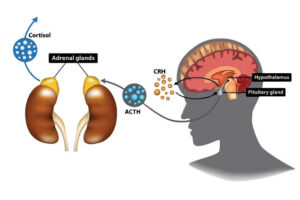One of the most frequent symptoms I come across, while consulting patients through various health issues, is ‘Fatigue’. Cases of exhaustion and fatigue have been on the rise, especially since the onset of the pandemic. I witness the epidemic of extreme exhaustion daily, as patients complain about feeling exhausted on waking up, and depend on caffeine to keep them going through the day.
They feel irritation more often, as also extreme hunger pangs, and crave salty and/or sugary foods. This is due to chronic fatigue, and difficulty losing weight despite following the best diet and exercise regime. They have little or no sex drive, their energy levels crash by afternoon, and they increasingly feel the need to take a nap. Because this is becoming increasingly common, many unfortunately think it’s normal as many seem to feel the same way. But that’s far from the truth. Feeling constant fatigue is not normal. In fact, it is one of the primary symptoms of ADRENAL FATIGUE.

What is Adrenal Fatigue?
Before we talk about adrenal fatigue, let’s talk about adrenal glands. These sit atop your kidneys and regulate and produce many important hormones in your body. The main job of adrenal glands is to control the release of your stress hormone, or cortisol, which is essential for your survival. As we evolved from the stone ages, our bodies learnt how to deal with external stressors, like predators, etc. During the stress response, the adrenal glands released cortisol, which increased blood pressure and blood-sugar for faster response and better survival. When the predators were gone, the cortisol decreased, and so did blood pressure and blood sugar levels. Normal balance was restored. However, ongoing stress even today activates the same memory and response (like a predator) and doesn’t turn it back off. This constant stress signal causes intense adrenal fatigue, thus affecting your energy and health.
Having understood how adrenal glands function, let’s talk about ‘Adrenal Fatigue’. In healthy individuals, cortisol level is higher in the mornings to help you prepare for the day and slowly lowers, through the day. Melatonin, your sleep hormone, is directly connected to cortisol, and is inversely proportional to it – hence, when cortisol level is high, melatonin is low and vice versa. Adrenal fatigue occurs due to the imbalance in this cortisol rhythm – cortisol could be either low when it should be high, or high when it should be low, or always low or always high. Adrenal fatigue is really a dysfunction of your brain’s communication with your adrenals and not the adrenal glands themselves. Cases of adrenal fatigue differ from each other.
Root Causes of Adrenal Fatigue:
Some of the root causes of Adrenal Fatigue include Autoimmune conditions; Viral / Bacterial infections; Accidents /Injuries; Emotional stress and Food intolerances.
Common Symptoms of Adrenal Fatigue:
Check yourself for symptoms like: Waking up groggy; Sugary or salty foods cravings; Low sex drive; afternoon fatigue; Need for caffeine all-day; Need to nap in the day; Dizziness when standing up quickly; Headaches; Blood sugar fluctuations; Chronic inflammation; Weak nails and brittle hair; Mood swings; and Difficulty losing weight despite sincerely following a good diet and exercise regime. For an accurate diagnosis, I make my patients answer an ‘Adrenal Fatigue Quiz’ before the start and end of the program.
Treatment Of Adrenal Fatigue:
Now that you know that you could ‘possibly’ be undergoing Adrenal Fatigue, here are some ways to help you recover:
Learn How To Manage Chronic Stress: Identify the key areas of your stress and work towards modifying them. You can never eliminate all stress in life but you can regulate working in periods of rest and relaxation to reduce stress levels for a while. This will break the chronic stress cycle and help you regain health and feel like your old vibrant self again!
Try Reducing Inflammation: Curcumin, a compound found in turmeric root, has potent antioxidant properties. It also helps in enhancing your mood.
Eat The Right, Nutrient-Rich Foods: like Leafy greens; Asparagus; Avocado; Extra virgin cold-pressed coconut oil; Oysters; Turkey; Grass-fed Meats; and Wild-caught fish. Also, sipping on herbal teas like chamomile and Rooibos tea help. Add a magnesium supplement to your routine.
Breathing Exercises: Increase focus on adding breathing exercises to your routine.
Improve Your Sleep Quality: Good quality Sleep plays a strong role in reducing stress.
Spend More Time Outdoors: Exposure to sunlight especially works wonders!
Get Vitamin D Levels Tested: If it’s below the desired range, seek medical guidance from your health care professional.
Depending on your individual brain-adrenal dysfunction, you may need to work with a qualified practitioner to assess your condition and carefully replace a small portion of the levels of the missing adrenal hormones, for a period of time. It is necessary to find professional guidance to determine how much and how often, in order to nip that adrenal fatigue in the bud, in the healthiest way possible.
- Healing or Harmful? - 15 March2025
- The Parsi Woman’s Guide To Superfoods For Hormonal Health - 8 March2025
- Strengthen Your Constitution This Republic Day! - 25 January2025
